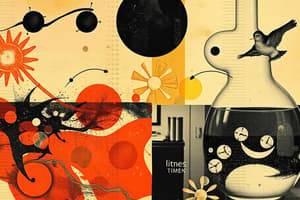Podcast
Questions and Answers
What unique property do solids possess?
What unique property do solids possess?
- Fixed shape but changeable volume
- Changeable shape but fixed volume
- Fixed shape and volume (correct)
- Changeable shape and volume
In which state of matter are molecules loosely packed and able to move relatively freely?
In which state of matter are molecules loosely packed and able to move relatively freely?
- Liquids (correct)
- Plasmas
- Gases
- Solids
What type of mixtures are solutions?
What type of mixtures are solutions?
- Colloids
- Homogeneous mixtures (correct)
- Heterogeneous mixtures
- Suspensions
Which state of matter has molecules that are widely separated and move rapidly in all directions?
Which state of matter has molecules that are widely separated and move rapidly in all directions?
What happens to the components in a mixture when they are mixed?
What happens to the components in a mixture when they are mixed?
Which process involves the solute dissolving in the solvent?
Which process involves the solute dissolving in the solvent?
What is the key characteristic of a material's properties?
What is the key characteristic of a material's properties?
When matter undergoes a physical change, what is altered?
When matter undergoes a physical change, what is altered?
How do physical changes in matter affect the number of atoms or molecules?
How do physical changes in matter affect the number of atoms or molecules?
Which instrument is commonly used to measure density?
Which instrument is commonly used to measure density?
What is an example of a physical change in matter?
What is an example of a physical change in matter?
Which term refers to substances that have different properties in various amounts?
Which term refers to substances that have different properties in various amounts?
Flashcards are hidden until you start studying
Study Notes
Exploring Matter in Our Surroundings
Matter, the substance that makes up everything around us, is fascinatingly diverse and complex. As we delve into the world of matter, we'll consider four key aspects: properties, physical changes, states of matter, and mixtures and solutions.
Properties of Matter
A material's properties are its inherent characteristics, such as color, hardness, and density. These properties allow us to differentiate between various substances. For example, lead is a heavy, silver-gray metal, while aluminum is a light, silvery metal.
Properties are often observed through our senses. For instance, we might touch a rubber ball to determine its softness or listen to the sound produced by striking a glass cup with a spoon. Scientists, however, can also measure properties using instruments, such as a thermometer to determine temperature or a hydrometer to measure density.
Physical Changes
When matter undergoes a physical change, it transforms into a different form without altering its composition. For instance, ice melting to water, or water evaporating to become water vapor. In such processes, the resulting substance has different properties than the original material.
Physical changes do not affect the number of atoms or molecules in a substance. In other words, the chemical composition of matter remains constant. For example, the water molecules in ice and liquid water are identical, but their physical states differ.
States of Matter
Solids, liquids, and gases are the three fundamental states of matter. Each state has unique properties and arrangements.
- Solids have a fixed shape and volume. The atoms or molecules in a solid are closely packed and vibrate around fixed positions.
- Liquids have a fixed volume but an easily changeable shape. Molecules in a liquid are loosely packed, allowing them to move relatively freely without leaving their overall volume.
- Gases have both a changeable shape and volume. The molecules in a gas are widely separated and move rapidly in all directions.
Mixtures and Solutions
Mixtures are combinations of two or more substances that do not form chemical bonds. When mixed, the components retain their individual properties and can be separated relatively easily. For instance, sand and water form a mixture, as the sand particles do not dissolve in water.
Solutions, on the other hand, are homogeneous mixtures in which the solute (the substance dissolved) and solvent (the substance that dissolves the solute) are evenly distributed. The solute and solvent can form chemical bonds, as in salt dissolving in water, or they can remain separate, such as sugar in water.
In conclusion, the world around us is made up of matter, with its properties, states, and interactions providing a vast and intriguing playing ground for scientific exploration. By understanding these basics, we can not only appreciate our surroundings but also develop insights that may lead to new discoveries and innovations.
[Markdown end]
Studying That Suits You
Use AI to generate personalized quizzes and flashcards to suit your learning preferences.




